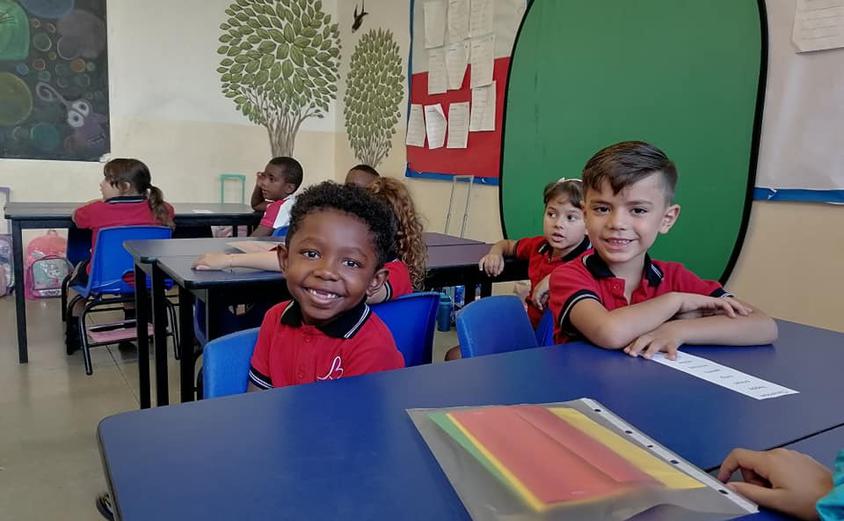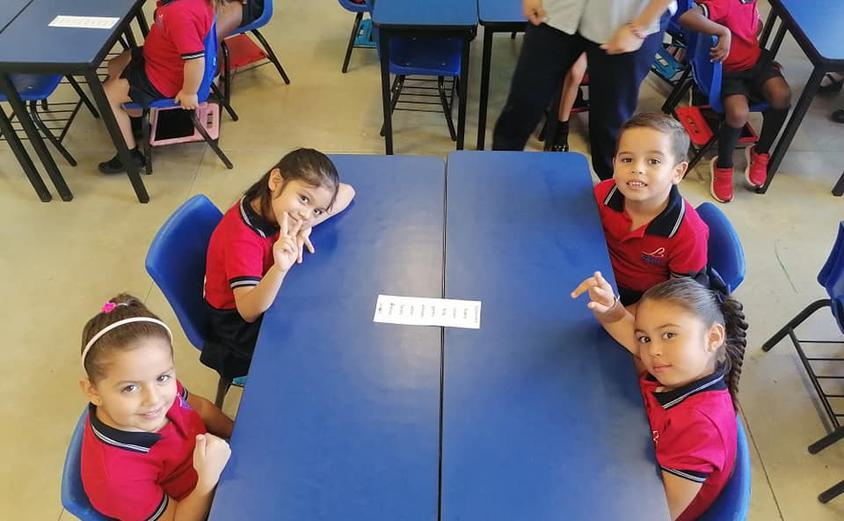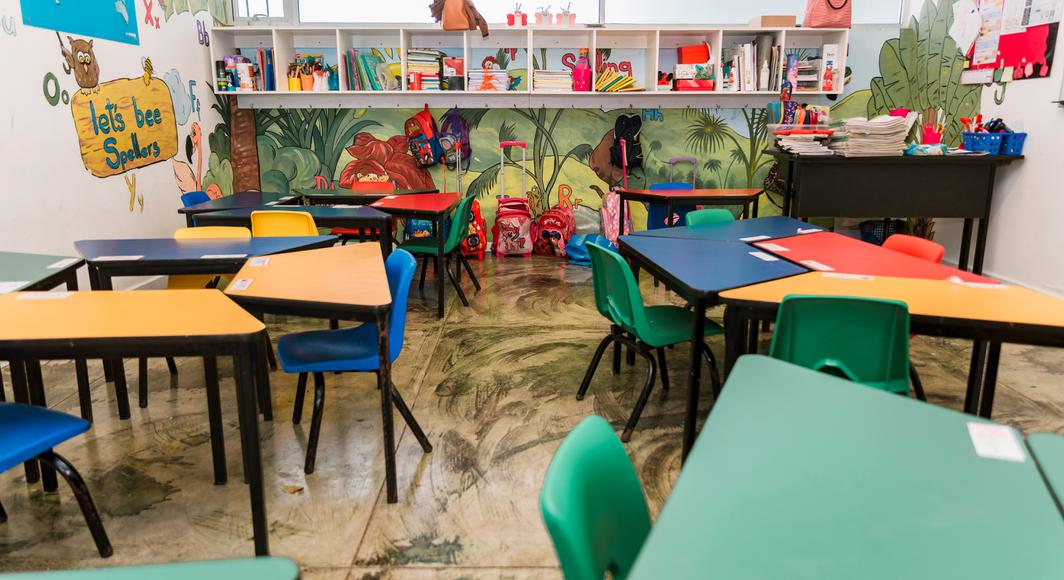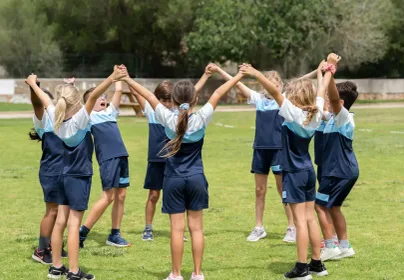Before our Panthers left school for the summer, they spent some time in the grade above. This gives them the opportunity to get accustomed to their new environment and to hear about what they’ll learn, and what will be expected of them, in their next year’s studies at Britt Academy.
Kindergarten
For our youngest students who are moving from Kindergarten to Primary, our taster or ‘step-up’ days, are all about introducing our littlest learners to their environment and teachers. Studies have shown that very young people crave familiarity, as it can bring on feelings of enjoyment, making them feel more confident and comfortable.
So we nourish this at Britt by making sure that our little mores are happy and excited about their move to what they call "big school".
Primary
For our Primary students, during their time in their next classroom, our coaches start to introduce students to the curriculum, what they will study in the year ahead and what’s expected of them. It’s a great opportunity for students, and parents to think about areas where their child(ren) are particularly strong and passionate, and where Britt Coaches and language teachers can support their child(ren) so they are at the expected academic level when they leave Primary.
If you would like to know more about our curriculum in Primary, some of the core skills that we teach our Primary students, and some of the expectations that we have for their abilities in their first couple of years in Primary are outlined below.
You can also find out more on our Primary page.
- Review the alphabet and the use of capital and lowercase letters.
- Use proper and common nouns.
- Separate words syllabically.
- Recognizes the types of stories, people, and their parts.
- Identifies the parts of the book and solves crossword puzzles.
- Conducts interviews.
- Identifies synonyms and antonyms, augmentative and diminutive.
- Elaborates letters, makes descriptions of people, objects, etc.
- Elaborates rhymes and couplets.
- Exhibits and makes posters.
- Discriminates between masculine and Uses articles, and personal pronouns.
- Recognizes the elements of a newspaper,
- Makes exclamatory, affirmative interrogative and negative sentences.
- Alphabet. Personal pronouns.
- Possessive nouns.
- Identifies adjectives as words that modify and provide characteristics to nouns.
- Identifies adverbs that indicate how and when.
- Differentiates between the use of definite and indefinite articles.
- Reading and Comprehension.
- Retells stories in their own words using story elements.
- Verbs; have, had, and has.
- Analyzes rules at home and at school.
- Acquires new grade-level vocabulary words in a variety of contexts.
- Relates diphthong sounds to spelling patterns and develops decoding skills in context.
- Formulates and answers questions about a text. Identifies the author's purpose in a text.
- Analyzes street signs and related words.
- Uses multiple strategies to develop and expand oral vocabulary.
- Uses verbal and nonverbal language to receive and express information.
- Works to improve their spatial location.
- Recognizes ordinal numbers.
- Performs 3-digit addition and subtraction.
- Learns Roman numerals up to XX.
- Performs mental arithmetic.
- Develops numerical series of 2 by 2, 3 by 3, 5 by 5, 10 by 10, and 100 by 100.
- Recognizes geometric shapes and figures.
- Greater than and less than.
- Develops body care skills, and healthy living habits.
- Recognizes children's rights, and human rights.
- Identifies the physical states of water and the care it requires.
- Classifies animals, plants, and materials based on characteristics that they identify with their senses. Recognizes that their actions can affect nature and participates in those that help to take care of it.
- Distinguishes characteristics of nature in the place where he/she lives.
- Uses appropriate digital tools to communicate.
- Demonstrates responsibility when working as part of a team.
- Identifies, begins to recognize their emotions, and self-regulates them.
- Begins to demonstrate peaceful conflict resolution skills.
Junior High
When we do ‘step up’ days for our older children, as well as giving them the chance to spend some time in their next classroom, looking at their next grade study materials, we share with them, what's next on the curriculum.
As students progress towards high school, we ensure that they are achieving the best they can and that we’re sending them on the right path towards an outstanding university, or career opportunity. So these sessions are about setting expectations and ensuring our Panthers know what we expect academically, as well as encouraging the behaviours that produce valued global citizens.
We also make sure our Panthers know what school trips and extra-curricular activities, and sports will be available to them as they progress through Junior High.
Below, we outline some of the core skills and expectations we have for our Junior High students. You can also find out more on our Junior High page.
- Recognize the syntactic categories that exercise the function of the subject in a sentence.
- Use and apply spelling rules in words that imitate a sound.
- Collects and shares proverbs and popular sayings. Identify the structure and characteristics of an informative text and use it to better understand.
- Demonstrates command of the conventions of standard English grammar and usage when writing or speaking.
- Acquire and uses academic and domain-specific vocabulary and figurative language important to comprehension or expression.
- Demonstrates command and awareness of the conventions of standard English capitalization, and spelling when writing and reading.
- Pronouns correctly and enhances listening abilities.
- Analyzes and compares situations of linear variation from their tabular, graphical, and algebraic representations.
- Interprets and solves problems that are modeled with these types of variation.
- Collects, records, and reads data on pie charts.
- Solves problems involving the calculation of percentages.
- Calculates the volume of prisms whose base is a triangle or quadrilateral, developing and applying formulas.
- Uses a variet of visual tools to represent information
- Compares socioeconomic conditions Distinguishes the function of materials Identifies materials according to their origin and application in technical processes.
- English Geography indifferent territories of the world through the interpretation of the human development index.
- Distinguishes the function of materials and energy in technical processes.
- Identifies materials according to their origin and application in technical processes.
We hold these transitional sessions for all our students, because we like our students to see the bigger picture when it comes to their education. We also hold sessions with our Britt Parents, so they know what their child(ren) are learning year to year, as well as what they will learn overall in each grade.






